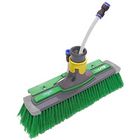So let's take a closer look at which bristle is best-suited for which use!
1. Brushes with flocked bristles
UNGER’s nLITE brushes with flocked bristles have a greater contact surface, thus improving their cleaning performance. They are also easier to handle because they glide better on the surface you are cleaning than the unflocked version. These features mean that they are best suited to the periodic cleaning of windows with a normal amount of soiling.
2. Brushes with unflocked bristles
If you can’t guarantee sufficient water flow or if the window panes you are cleaning are very dirty, then stay on the safe side by choosing a brush with unflocked bristles. Less dirt sticks to them, and brushes with unflocked bristles also last longer. They also have an advantage when it comes to cleaning surfaces with a low angle of inclination such as solar panels. The reason: surfaces like this accumulate particularly large amounts of dirt, plus the dirty water flows off more slowly than on vertical surfaces due to the significantly shallower angle.
Beware of scratches!
Whether you choose flocked or unflocked bristles, you should always do one thing: test the brush on an inconspicuous area of the surface before using it for the first time. Why? Some surfaces are very sensitive to scratches and experience has shown that it is better to be safe than sorry!







